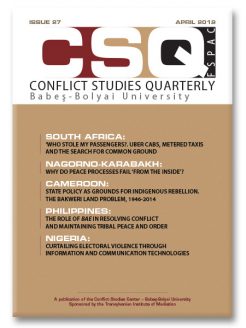
Issue 27 – April 2019
TOPICS: Uber vs. Taxi drivers conflict, Nagorno-Karabakh, Indigenous Rebellion, Tribal Peace, Electoral Violence
Coordinator:
Christian Chereji and Ciprian Sandu
ARTICLES in Issue 27 – April 2019:
South Africa: ‘Who stole my passengers’?. Uber cabs, metered taxis and the search for common ground
Joseph Olusegun ADEBAYO
Abstract:
When Uber Cab services started in 2009 as a ‘tap-a-button-get a ride’ idea of moving from one point to the other easily, little did the founders know it would grow into one of the biggest start-ups in the world in such a short time. Uber has revolutionized the cab industry by introducing an app that gets people rides from ‘simple taps’. Although there are many positives from Uber’s emergence, it is imperative to note that its rapid growth across the globe has caused frictions with metered taxi operators who have existed in the cab business milieu several years earlier. In most major cities of the world where Uber is operational, there have been some degrees of revolt and even violence between Uber drivers and metered taxi operators. The metered taxi operators cite grievances such as the use of unlicensed drivers by Uber, unfair competition and the ‘stealing’ of their passengers. Since Uber’s 2013 launch in South Africa, there have been growing clashes between the platform and metered taxi operators with incessant disruptions to services, injuries and deaths, as well as damages to cars. This study examines the recurring conflict between Uber cab drivers and metered taxi operators within the Cape Town area of South Africa with the aim to proffering, from the aggrieved and affected drivers, effective conflict management strategies to mitigate the seemingly protracted conflict.
Keywords:
conflict, conflict management, common ground, relative deprivation, frustration, aggression
DOI: https://doi.org/10.24193/csq.27.1
Nagorno-Karabakh: Why do peace processes fail ‘from the inside’?
Roxana Gabriela ANDREI
Abstract:
The leaders of Armenia, Azerbaijan and the representatives of the OSCE announced in Paris, in January 2019, the firm intention to move forward for a peace compromise on the longstanding conflict in Nagorno-Karabakh. The prospect of peace however triggered anxieties among the Armenians fearful of losing the territories gained in war, as well as among the inhabitants of Nagorno-Karabakh, while the Azerbaijanis maintain that any future peace compromise cannot start without the withdrawal of the Armenian forces from these lands. Peace became a source of anxiety and entrenched attachment to old narratives overcame, for the moment, the optimist rhetoric shift of state leaders. The article thus looks into the possible reasons for a peace process to fail ‘from the inside’, to be rejected by the very populations affected by an abiding conflict, bringing insides from cognitive approaches to conflict and security, namely from the ontological security body of literature to this purpose.
Keywords:
Nagorno-Karabakh, conflict, peace, OSCE, diplomacy, security
DOI: https://doi.org/10.24193/csq.27.2
Cameroon: State Policy as Grounds for Indigenous Rebellion. The Bakweri Land Problem, 1946-2014
Venantius Kum NGWOH
Abstract:
The history of Africa in recent years has been marked by instability in the form of separatist movements, agitations for political rights and freedoms as well as open resistance against government action. This study about conflict over natural resources explores the leeway as well as the mechanisms that enhanced the alleged loss of land rights by Bakweri people in Fako Division of Cameroon and evaluates efforts they exerted to retrieve these appropriated lands. Cameroonian post-colonial state policy between 1963 and 1974 invalidated the provisions of a 1958 Land and Native Rights Ordinance that had re-established customary rights over colonial entitlements to land, thereby transforming homegrown people from owners to holders of their ancestral lands. This policy was exactly calculated to extort the inalienable communal property of the various peoples whose privileges to land were based upon immemorial usage and who were attached to their lands in life and limb. After about a century of persistent land hunger, they formed a Bakweri Lands Claim Committee (BLCC) to wrest their ancestral lands from alien occupants. Although the confrontation raged for about 150 years, the divide-and-rule policies of successive governments invalidated their efforts. According to research findings, the exacerbation of this imbroglio was another ploy by a French-speaking dominated apparatchik to totally dismantle and disrupt the nascent economy of the English-speaking part of the country. Through their actions, government officials authenticated the fact that Cameroon law did not protect indigenous minority rights and openly demonstrated that Bakweri land rights could only be restored if Decree No. 74-1 of July 6, 1974 that established rules governing land tenure in Cameroon was amended. Whereas the Bakweri indigenes have struggled to restitute their land rights, the regime consistently exerted its authority by invoking the law that declares inter alia, “… the state shall be the guardian of all lands”. But strangely enough, BLCC members have hailed this same law as a confirmation of their rights of private ownership and in 1999, their chiefs stated emphatically that “this cannot possibly apply to CDC occupied lands [which] were known even to the German colonial administration and would have featured in the official German land registers…”. Thus, while the Bakweri claimed private property rights, the state remained unyielding that the assertion was a farce and that is why its authority has remained primordial in a land surrender process that it initiated in 2003 and halted in 2014.
Keywords:
Bakweri, Germano-Duala Treaty, grundbuck, “Kamerun idea”, land surrender
DOI: https://doi.org/10.24193/csq.27.3
Philippines: The Role of Bae in Resolving Conflict and Maintaining Tribal Peace and Order
Primitivo III C. RAGANDANG & Sulpecia L. PONCE
Abstract:
This exploratory research investigates the role of baes (women members of the tribal council) in the traditional system of conflict resolution, as well as in maintaining tribal peace and order. With the Higaunon tribe of Barangay Kiabo, Malitbog, Bukidnon province, Philippines, as case in point, the data employed in this study include the responses of the members of the tribal council, especially of the baes. The study uses a qualitative approach and the data is interpreted using descriptive analysis. The study shows the historical account of the Higaunon tribe, including its patriarchal nature. It also discusses the qualifications, selection process, as well as koda (coding) given to the bae. The article then looks into the roles and responsibilities of the baes in the traditional conflict resolution of the tribe and the role they play in maintaining the peace and order of the tribe in general. Similar with their male counterparts, baes are being selected by the tribal chieftain. The tribal chieftain is also the one who assigns tasks to the baes while, in many instances, the baes serves as the record and tribal activity keepers, making it sure that tribal policies and affairs are observed properly
Keywords:
bae, Higaunon, traditional conflict resolution, tribe, peace
DOI: https://doi.org/10.24193/csq.27.4
Nigeria: Curtailing Electoral Violence Through Information and Communication Technologies
Raji SHITTU & Angelina Iheoma ONYEUKWU
Abstract:
This paper examined the contributions of the Information and Communication Technologies (ICTs) towards transparent and violence-free elections in African countries with specific focus on Nigeria, which is the largest democracy in the continent. Many countries have witnessed violent electoral contests, arising from the inability of the electoral umpire to conduct free and fair elections, hence the introduction of ICTs to correct the lapses. The objectives of this paper were to identify major ICTs gadgets for the conduct of elections in Nigeria and evaluate the extent to which the devices have curtailed electoral violence. The paper adopted an interpretive case study as its research methodology. The interpretive method is based on analogical deductions and re-analysis of relevant existing literature from secondary sources to generate new findings. Findings from the paper were that the ICTs have added tremendous values to the credibility of electoral process in Nigeria by securing elections from intense manipulation and violence through the use of electronic gadgets, including the use of Direct Data Capturing Machine (DDCM), Automated Finger Prints Identification System (AFIS) and the Smart Card Reader (SCR). However, it is concluded that the use of ICTs has improved electoral credibility but has not substantially reduced electoral violence in Nigeria as the electronic gadgets have relocated such electoral debacle from physical to electronic violence, and from manual to digital electoral manipulation. Digitalized electoral process in Nigeria is also faced with machine failure, system hacking and poor logistic supports. It is recommended that the usage of ICTs in the conduct of elections in Nigeria should be sustained as a complement, rather than supplement, to the traditional manual voting system in Nigeria. This recommendation is premised on the fact that Nigeria is not yet ripe for sole reliance on electronic voting system, which is largely challenged by inadequate power supply, derth of highly skilled ICTs technicians and high rate of ICTs non-compliance illiterate voters.
Keywords:
contribution, credibility, violence, Nigeria, politics, election, ICTs.
